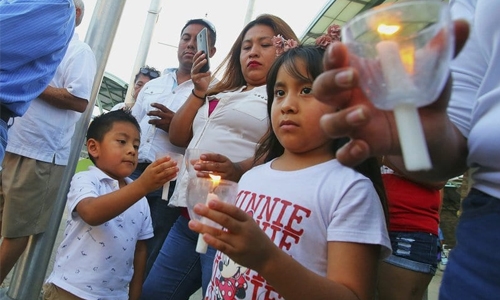Little Valeria Ramirez, her dad, a symptom of a much bigger problem
Migrants, it seems, are never out of the news. The numbers are difficult to process but the UN Department of Economic and Social Affairs has a revealing migration map. It shows, as you might expect, that the massive population movements are from poor to wealthier countries. Europe, the US and Russia see people coming in; Africa and South America see people going out. The numbers are mindblowing.
In its most recent international migration report, the UN said there were an estimated 258 million people living in a country other than their place of birth – an increase of 49 per cent since 2000. Numbers are faceless and so it falls on the stories of children, or the shocking image of a single human tragedy, to strike a chord. In 2015, it was a little Kurdish Syrian boy, Aylan Kurdi. He was three years old when he drowned at sea and his body was washed up on a foreign shore. The incident tugged the heartstrings – for a while, until the numbers became faceless once more, provoking a political backlash stretching from Italy to the US.
This week it was the turn of Valeria Ramirez, a month shy of her second birthday, to put a name and a face to mass migration. Valeria drowned with her father, Oscar Alberto Martinez Ramirez. They were found face down, the little girl’s arm wrapped round her father’s neck, washed up on the mudbanks of the Rio Grande river after trying to cross the border from Mexico into the US. Mr Martinez and his family were fleeing El Salvador, a poor Central American country terrorised by an estimated 25,000 gang members, with another 9,000 in prison.
The “maras”, as the gangs are called, are among the most violent and sadistic in the criminal underworld. El Salvador is said to have the highest murder rate in the world for men under the age of 19. You can see why Mr Martinez wanted to get out and reach the US, despite the unwelcoming face presented by US President Donald Trump’s core election slogan “build the wall” to keep Latino migrants out. Mr Trump blamed his political opponents, Democrats in Congress, for the deaths. “The Democrats refuse to change the loopholes,” he claimed. “They refuse to change the asylum. In one hour we could have it done. They want to have open borders and open borders mean crime.
And open borders mean people drowning in the rivers and it’s a very dangerous thing.” Mr Trump’s words found a surprising echo from Russia’s president Vladimir Putin who told the Financial Times that German Chancellor Angela Merkel’s immigration policy, accepting nearly one million refugees, including more than half a million Syrians, was “a cardinal mistake” and that “the liberal idea has become obsolete”. Mr Putin, who drew no apparent distinction between migrants and refugees, said: “This liberal idea presupposes that nothing needs to be done. That migrants can kill, plunder and rape with impunity because their rights as migrants have to be protected.”
Mr Putin suggested that populism of the type endorsed by Italy’s interior minister Matteo Salvini, Brexit Party leader Nigel Farage in the UK, and other politicians, mostly on the far-right in Europe, was now the consensus. Donald Tusk, president of the European Council, responded pointedly that what was obsolete was “authoritarianism, personality cults and the rule of oligarchs”. Uncontrolled and uncontrollable migration is undoubtedly a destabilising force in democracies across the world. Only a heart of stone could fail to be moved by pictures like those of Valeria, her arm in a final embrace around her father. But such suffering and the miseries of mass migration are likely to increase.
Climate change and desertification render swathes of land unfit for farming or human habitation. In the past few days, some European countries have experienced record-breaking temperatures. Add conflict, disease, famine, crime such as that committed in El Salvador, and the wish of most citizens from most countries to seek a better life creates the noxious cocktail that makes migration the story of our times. Beyond the political slanging match, what are we going to do to minimise human suffering and also to prevent the rise of authoritarian populists, who use a legitimate concern as a political rallying cry?
Related Posts

